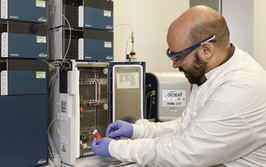A Tale of Two Continents
How discussions between the European and African Unions have culminated in a new deal for African vaccine production

This article was written by Angus Stewart based on an interview with Stavros Nicolaou, Group Senior Executive, Strategic Trade at Aspen Pharma Group
In my country South Africa, we seem to be moving through the final stages of our Omicron wave. However, this doesn’t mean we’ve reached the end. Experts have predicted a fifth wave in the winter months, possibly to be sparked by a new variant, which will hopefully continue the downward trend of lower virulence experienced with Omicorn.
And even when the COVID-19 pandemic is over, we will still need to be prepared for future pandemics. Letting our guard down once COVID-19 is “over” would be foolhardy; you cannot plan for pandemics at the onset; you need to plan between them. Preparedness is crucial – everywhere. Here in Africa we are seeing various moves toward this level of preparedness, but bolstering the strength of our healthcare system remains an ongoing challenge.
Just recently, representatives from the EU and the African Union convened in Brussels for the sixth EU–AU summit (1). Naturally, they hit on a wide range of topics, including two dedicated sessions on vaccines, which resulted in the various parties releasing a highly significant joint statement: “Learning from the current health crisis, we are committed to supporting fully-fledged African health sovereignty, in order for the continent to respond to future public health emergencies.”
I believe that “sovereignty” is an enormously important keyword here. To date, Africa has received only 4 percent or less of the global vaccine rollout. At the time of writing, only 18 percent of the continent has been vaccinated. African vaccination programs commenced rather late in the pandemic, and found themselves dependent on Indian vaccine manufacturers – a dependence that became a problem when the Indian government imposed export restrictions.
The lesson that I – and many others in Africa – have taken away from these past 24 months is that we need to focus on using local capacity to solve local problems. We’ve found that the rest of the world will look after itself first – understandably – and only move to help others once it finds itself with a sizable oversupply of vaccines.
Of course, your local capacities are only as good as your multilateral procurement agencies. Far too many times, I’ve seen facilities open in Africa to meet an initial demand, only to run into security-of-supply problems further down the line. If there’s no demand, the facilities shut down and become white elephants.
We must do a little swimming against the tide. Right now, the African continent’s import/export model more or less boils down to the export of raw materials – especially rare metals – and the import of more advanced products. Consider mobile telephones as an example; their production is dependent on metals often sourced from Africa, but those same raw materials are used in advanced manufacturing on other continents and sold back to Africa at prices significantly higher than the collective cost of the raw materials.
It’s no surprise then that Africa imports 99 percent of its vaccine requirements, and produces only 1 percent “in house.” Zooming further out, we can see the real absurdity of the situation. Africa has, by far, the worst disease burden of any continent. Africa suffers from both non-communicable and communicable diseases, but the continent continues to import almost all of its medicine requirements. This is counterintuitive.
The answer is localization, but localization depends on access to scarce technologies. The problem of access can be solved by technology transfers and IP transfers. This is what happened with HIV; we managed to bring generic antiretroviral products to market via voluntary licensing.
In the case of COVID-19 and the pandemics of the future, I have some views on how to remedy Africa’s pharmaceutical conundrum. My employer, Aspen, is collaborating with Johnson and Johnson and others to commence vaccine production in Africa. Aspen had already built up significant sterile capacity and capability over the years, running from the city of Gqeberha (formerly Port Elizabeth) as the largest supplier of general anesthetics outside of the US. At the onset of the pandemic, we became a major supplier of muscle relaxants and anesthetics to Europe because we were working to meet a demand that was surging in response to mass-hospitalizations that came first in Italy and France, and then Spain. General anesthetics and muscle relaxers are used to ventilate patients.
The pandemic spurred our collaboration with J&J, which began as a contract manufacturing agreement; we would manufacture their vaccine and they would determine its allocation and distribution. They transferred their technology to us in October 2020 (to enable the contract manufacturing to take place), and production began in March 2021. To date, we have produced around 180 million doses for and on behalf of J&J, the majority of which have either been used or bought by Africa.
This partnership was certainly a positive development and led to the next step, which was the conclusion of a licensing agreement between Aspen and J&J, whereby J&J licensed its IP to Aspen, which leads to vaccine autonomy.
That in turn led numerous African leaders to engage in extensive discussions with the EU, the World Bank, the World Trade Organization, World Health Organization and other important multilateral organizations. Leaders from Africa included South Africa’s President Cyril Ramaphosa (who also happens to be the African Union’s COVID-19 champion) and various leading figures who serve on the African Vaccine Acquisition Task Team and the Africa Center for Disease Control and Prevention.
The conversations led to a new licensing agreement between Aspen and J&J, announced in November 2021, which grants Aspen access to the IP for the Janssen COVID-19 vaccine, so we can produce it under a name of our own choosing (Aspenovax). Essentially, the deal gives Aspen the ability and capacity to produce its own vaccine and to allocate and distribute into African markets, which in turn grants Africa greater security of supply and greater vaccine autonomy. Once this is achieved, the likes of Indian export restrictions during pandemics become less of a headache and less able to induce crises.
More recently, we’ve made a more strictly Euro-African collaboration with two German companies: Siemens and DEG. The German government also got involved here – in fact, it was the German Federal Ministry for Economic Cooperation and Development that commissioned DEG to invest in our capacities, as part of a general recognition of the uneven distribution of vaccines globally, and a need for European players to help in addressing the issue.
In short, Aspen has received digital technology that enables people on our production lines to more readily discard potentially defective products. The vaccine product is highly temperature sensitive, so if it is moved outside of safely controlled temperature levels then it’s important that we catch it as soon as possible. The new technology provides alerts that help us do that. The German government is also helping to fund the training necessary to use the new technology.
I may have made this all sound very easy, however I can assure you this is not the case. Licensing technology can be a very complex and tense issue. To be willing to license away your IP, you really need to trust the licensee. If the licensees don’t have the necessary expertise, capability, and competence, then the R&D based companies won’t feel comfortable. In this case, J&J made a concerted effort to find the most competent players on the continent. I’m proud that they settled on Aspen.
Speaking of trust and pride, I’ll add that Aspen and its capabilities don’t exist in a vacuum. We are proof that Africa has expertise. To help the story of Aspenovax become part of a continuing pattern and not just a one-off story, Africa needs more champions. I hope future endeavors will better prepare the continent for the next pandemic.
- European Council, “European Union - African Union summit, 17-18 February 2022”, European Council – Council of the European Union (2022). Available at: https://bit.ly/EU-AU-2022
Between studying for my English undergrad and Publishing master's degrees I was out in Shanghai, teaching, learning, and getting extremely lost. Now I'm expanding my mind down a rather different rabbit hole: the pharmaceutical industry. Outside of this job I read mountains of fiction and philosophy, and I must say, it's very hard to tell who's sharper: the literati, or the medicine makers.



















